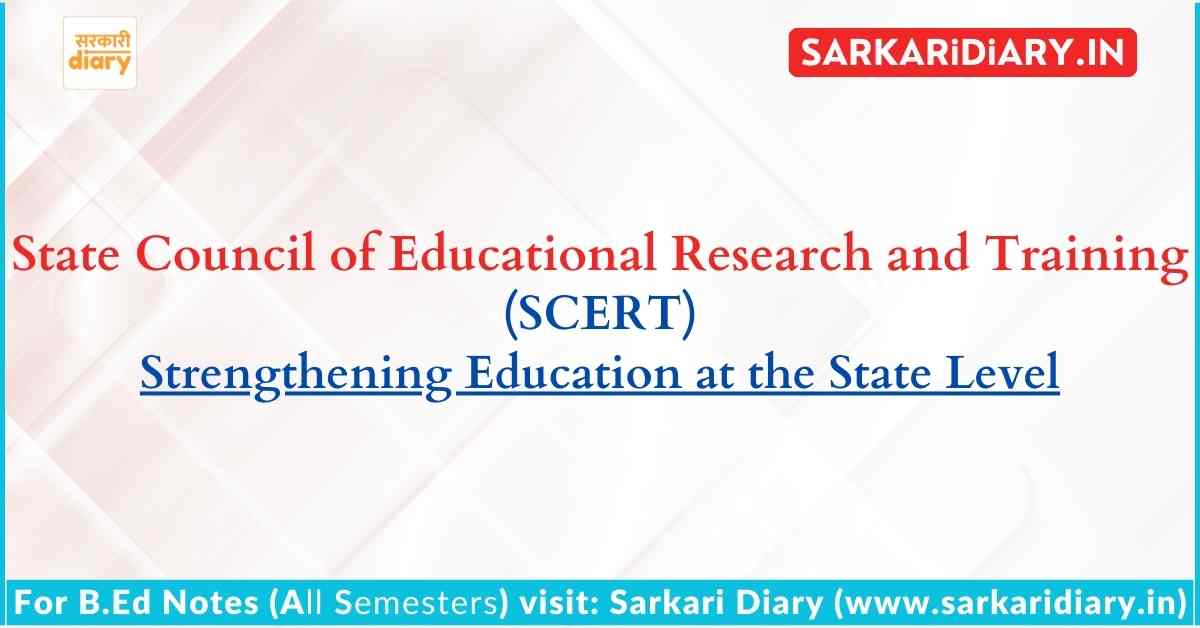State Council of Educational Research and Training (SCERT) is a crucial academic institution functioning under the State Department of Education. Established on the lines of the National Council of Educational Research and Training (NCERT), SCERT plays a central role in the academic planning, curriculum development, and teacher training at the state level.

While education remains a State Subject under the Indian Constitution, SCERT bridges the gap between national-level directives (from NCERT) and grassroots-level implementation. In some states, SCERT is also known as the State Institute of Education (SIE).
Governance and Administrative Structure
SCERT operates under the supervision of the State Education Department, typically chaired by the State Education Minister through a Programme Advisory Committee.
Key Administrative Structure of SCERT
| Position/Body | Function |
|---|---|
| State Education Minister | Chairperson of the Programme Advisory Committee |
| Directorate of SCERT | Headed by a Director, assisted by Joint Directors of various sections |
| State Advisory Bodies | Assist in policy decisions and programme planning |
| Regional/District Education Officers | Receive academic guidance and support from SCERT |
Departments under SCERT
SCERTs have multiple divisions to ensure specialised focus on various educational domains:
| Department/Section | Area of Focus |
|---|---|
| Physical Education | Training in physical and sports education |
| Audio-Visual Education | Development of multimedia teaching tools |
| Institute of English | English language learning and teaching methodology |
| Vocational Guidance | Career counselling and skill development |
| Examination Unit | Examination reforms and evaluation practices |
| Curriculum Development | Designing and revising school curricula |
| Teacher Education | Pre-service and in-service teacher training |
| Textbook Production | Development and review of textbooks |
| Non-Formal Education | Educational support for out-of-school learners |
Core Functions of SCERT
SCERTs serve as the academic think tank for each state’s education system.
Primary Functions
| Function | Description |
|---|---|
| In-service Training | Regular capacity building for teachers and education officers |
| Educational Research | Research on pedagogy, assessment, and curriculum |
| Extension Activities | Community education and outreach |
| Teacher Training | Orientation and development for new and existing educators |
| Publications | Production of educational journals, textbooks, and periodicals |
| Curriculum Improvement | Designing and upgrading syllabi and teaching methodologies |
| Educational Evaluation | Development of evaluation techniques and assessment tools |
| Educational Innovation | Experimentation and adoption of new educational practices |
Objectives of SCERT
SCERT aims to ensure academic excellence, inclusivity, and innovation at all levels of school education. Key objectives include:
- Providing induction training for newly appointed educational personnel.
- Organising seminars and workshops for district and state-level officers.
- Offering guidelines to school complexes for effective academic functioning.
- Conducting action research and surveys on school education.
- Producing and reviewing educational materials and textbooks.
- Offering correspondence courses for continued teacher professional development.
- Enhancing science, mathematics, and environmental education.
Educational Projects and Collaborations
SCERTs actively partner with national and international organisations like NCERT and UNICEF to implement state-specific programmes. Some notable initiatives include:
Key SCERT Programmes (Tamil Nadu Example)
| Programme/Project | Description |
|---|---|
| PECRP (Primary Education Curriculum Renewal Project) | Curriculum revision for Classes I–V in select primary schools |
| DALEP (Development Activities in Literacy & Participation) | Community-based education in selected regions |
| CAPE (Comprehensive Access to Primary Education) | Enhancing access to quality primary education |
| Environmental Education Workshops | Training programmes on sustainable education practices |
| Science Kit Training | Capacity building of science teachers through hands-on workshops |
| Continuing Education Centres | Centres in Madurai and Kumbakonam to promote adult and continuing education |
| Correspondence Courses | Programmes for Tamil teachers and higher-grade educators |
| Teachers’ Centres | Academic support hubs in Madras, Madurai, and Tirunelveli |
Advisory and Evaluation Role
SCERT plays a crucial consultative role in shaping education policy and implementation at the state level:
- Advises the State Education Department on curriculum frameworks and expected learning outcomes.
- Supports the State Examination Boards in improving public exam processes.
- Organises training in educational evaluation for teachers, examiners, and administrators.
- Maintains education databases and publishes analytical reports on academic standards across districts.
SCERT’s Role as a Liaison Body
SCERT also acts as a bridge between NCERT and the State Education Department, ensuring smooth communication, policy alignment, and adaptation of national education programmes at the state level.
Conclusion
The State Council of Educational Research and Training (SCERT) is an indispensable academic body, driving curriculum development, teacher education, research, and innovation at the state level. With strong support from the state governments and collaboration with national and international bodies, SCERT continues to play a pivotal role in enhancing the quality and reach of school education in India.
As the country progresses with the implementation of National Education Policy (NEP) 2020, the role of SCERTs in translating policy into classroom practice becomes more vital than ever.